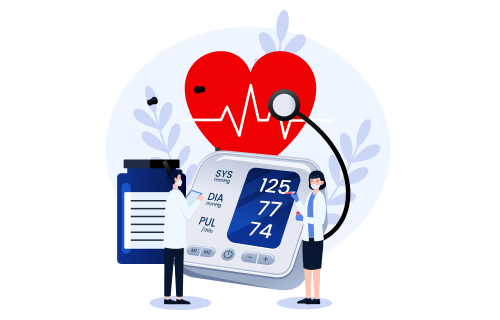High blood pressure affects millions of people in the United States and often develops silently over many years. This condition occurs when blood consistently pushes against artery walls with excessive force. Understanding hypertension can help you recognize symptoms, identify risk factors, and take control of your cardiovascular health.
What Is Hypertension?
Hypertension is a medical condition where blood pressure remains consistently elevated above normal levels. The cardiovascular system experiences increased strain as blood moves through arteries with greater force than necessary. This chronic elevation can damage blood vessels, organs, and tissues throughout the body over time.
Primary hypertension develops gradually without an identifiable underlying cause and accounts for most cases. Secondary hypertension results from specific medical conditions or medications and typically appears more suddenly with higher readings. Both types require medical attention and ongoing management to prevent complications.
The condition is often called the “silent killer” because many people experience no noticeable symptoms. Regular blood pressure monitoring becomes valuable since damage may occur long before symptoms appear. Early detection and treatment can prevent serious complications, including heart disease, stroke, and kidney problems.
What Causes It?
Multiple factors contribute to the development of hypertension, with genetics playing a significant role in predisposition. Family history increases your likelihood of developing high blood pressure, particularly when parents or siblings have been diagnosed. Age also serves as a risk factor, as blood vessels naturally lose flexibility and arterial walls thicken over time.
Lifestyle choices have a substantial impact on blood pressure levels and their progression. Excessive sodium intake causes the body to retain fluid, increasing blood volume and pressure within the arteries. Physical inactivity weakens the cardiovascular system and contributes to weight gain, both of which elevate blood pressure readings.
What Are the Symptoms?
Most people with hypertension experience no symptoms during the early stages of the condition. Blood pressure can remain elevated for years without causing noticeable discomfort or health changes. This absence of symptoms explains why regular blood pressure checks are necessary for early detection. Severe hypertension may produce headaches, nosebleeds, and heart palpitations.
How Can You Manage It?
Dietary modifications form the foundation of blood pressure management. Reducing sodium intake may significantly lower blood pressure readings. The DASH diet emphasizes fruits, vegetables, whole grains, and lean proteins while limiting processed foods and added sugars.
Regular physical activity strengthens the cardiovascular system and helps maintain healthy blood pressure levels. Activities such as brisk walking, swimming, or cycling provide cardiovascular benefits without requiring intense training. Weight management contributes to blood pressure control, as excess weight requires the heart to pump harder to supply blood to additional tissue. Meditation, deep breathing, and adequate sleep also support overall cardiovascular health.
How Is Professional Guidance Beneficial?
Healthcare providers can accurately diagnose hypertension through multiple blood pressure measurements taken on different occasions. Proper technique and calibrated equipment provide reliable measurements for treatment decisions. Medical professionals can also identify underlying conditions that may contribute to secondary hypertension.
Prescription medications may be necessary when lifestyle modifications alone cannot achieve target blood pressure levels. Healthcare providers select medications based on your specific health profile and monitor for side effects. Regular follow-up appointments enable adjustments to treatment, fostering healthy living.
Make Lifestyle Changes Today
Hypertension management requires a comprehensive approach combining lifestyle modifications with professional medical care. Understanding your blood pressure numbers, risk factors, and symptoms enables you to take an active role in maintaining your cardiovascular health. Take control of your blood pressure management by consulting with a healthcare provider to develop a personalized treatment plan that addresses your specific needs and health goals.
Social Sharing
Your Content Goes Here
Latest Posts





